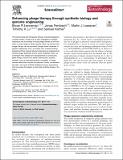Enhancing phage therapy through synthetic biology and genome engineering
Author(s)
Lenneman, Bryan R; Fernbach, Jonas; Loessner, Martin J; Lu, Timothy K; Kilcher, Samuel
DownloadPublished version (1.936Mb)
Publisher with Creative Commons License
Publisher with Creative Commons License
Creative Commons Attribution
Terms of use
Metadata
Show full item recordAbstract
The antimicrobial and therapeutic efficacy of bacteriophages is currently limited, mostly due to rapid emergence of phage-resistance and the inability of most phage isolates to bind and infect a broad range of clinical strains. Here, we discuss how phage therapy can be improved through recent advances in genetic engineering. First, we outline how receptor-binding proteins and their relevant structural domains are engineered to redirect phage specificity and to avoid resistance. Next, we summarize how phages are reprogrammed as prokaryotic gene therapy vectors that deliver antimicrobial ‘payload’ proteins, such as sequence-specific nucleases, to target defined cells within complex microbiomes. Finally, we delineate big data- and novel artificial intelligence-driven approaches that may guide the design of improved synthetic phage in the future.
Date issued
2020-12Department
Massachusetts Institute of Technology. Research Laboratory of Electronics; Massachusetts Institute of Technology. Synthetic Biology Center; Massachusetts Institute of Technology. Department of Electrical Engineering and Computer Science; Massachusetts Institute of Technology. Department of Biological EngineeringJournal
Current Opinion in Biotechnology
Publisher
Elsevier BV
Citation
Lenneman, Bryan R. et al. "Enhancing phage therapy through synthetic biology and genome engineering." Current Opinion in Biotechnology 68 (April 2021): 151-159 © 2020 The Author(s)
Version: Final published version
ISSN
0958-1669